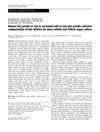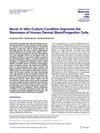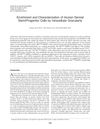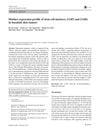 36 citations,
January 2014 in “The Journal of Sexual Medicine”
36 citations,
January 2014 in “The Journal of Sexual Medicine” Testosterone may help increase sexual events for women with low libido due to antidepressants.
36 citations,
December 2009 in “Skin pharmacology and physiology” Helium-neon laser treatment can stimulate hair growth in mice.
34 citations,
March 2007 in “Biochemical and Biophysical Research Communications” Thioredoxin reductase 1 does not affect glucocorticoid receptor activity in hair follicle cells.
 34 citations,
August 2003 in “Clinical and Experimental Dermatology”
34 citations,
August 2003 in “Clinical and Experimental Dermatology” Pregnant women's hair gets thicker.
 27 citations,
November 2005 in “Archives of Dermatological Research”
27 citations,
November 2005 in “Archives of Dermatological Research” Choosing hair follicles at the same growth stage leads to more consistent hair growth experiments.
![[4-t-Butylphenyl]-N-(4-imidazol-1-yl phenyl)sulfonamide (ISCK03) Inhibits SCF/c-kit Signaling in 501mel Human Melanoma Cells and Abolishes Melanin Production in Mice and Brownish Guinea Pigs](/images/research/4eb017dc-711d-4926-bcd0-c3b8f48e3a99/small/19974.jpg) 26 citations,
July 2007 in “Biochemical Pharmacology”
26 citations,
July 2007 in “Biochemical Pharmacology” ISCK03 stops melanin production in human melanoma cells and lightens skin color in mice and guinea pigs.
 24 citations,
July 2013 in “Oncologist”
24 citations,
July 2013 in “Oncologist” Bendamustine combined with rituximab is an effective and well-tolerated treatment for certain types of lymphoma.
 23 citations,
March 2019 in “The journal of investigative dermatology/Journal of investigative dermatology”
23 citations,
March 2019 in “The journal of investigative dermatology/Journal of investigative dermatology” ATP increases melanin production in skin after UV exposure, with the P2X7 receptor being crucial for this process.
 23 citations,
September 2018 in “Journal of Investigative Dermatology”
23 citations,
September 2018 in “Journal of Investigative Dermatology” A hydrogel made from pig fat helps wounds heal faster by regenerating skin fat cells.
 22 citations,
June 1993 in “Calcified Tissue International”
22 citations,
June 1993 in “Calcified Tissue International” Women with hyperandrogenic amenorrhea have similar bone density to healthy women but lower than androgenized women without amenorrhea, and high DHEAS levels might affect bone density.
 19 citations,
March 2012 in “Clinical Endocrinology”
19 citations,
March 2012 in “Clinical Endocrinology” FAI values above 6.4 may suggest high androgen levels and increased metabolic risks in Chinese women of reproductive age.
 19 citations,
October 1985 in “British Journal of Dermatology”
19 citations,
October 1985 in “British Journal of Dermatology” The document concludes that unruly hair can be congenital or acquired, often lacks specific treatments, and can be managed with oils and short hairstyles.
 18 citations,
January 2016 in “Elsevier eBooks”
18 citations,
January 2016 in “Elsevier eBooks” Nanotechnology improves cosmetics' effectiveness and safety.
 18 citations,
November 2013 in “Molecules and Cells”
18 citations,
November 2013 in “Molecules and Cells” New culture method keeps human skin stem cells more stem-like.
17 citations,
July 2015 in “Journal of nursing scholarship” Chinese kidney transplant patients often feel high blood pressure, hair loss, and tiredness from their medications, and more distress leads to worse medication adherence.
 14 citations,
December 2013 in “Experimental Dermatology”
14 citations,
December 2013 in “Experimental Dermatology” The T-zone on the face has more androgen receptors and produces more oil than the U-zone.
14 citations,
January 1982 in “International journal of radiation biology & related studies in physics, chemistry & medicine” Heavy ions cause significant damage to rabbit forebrains, similar to other radiation effects.
13 citations,
April 2021 in “Value in Health” There is a significant need for better-validated quality of life tools in dermatology.
 13 citations,
October 2017 in “Bioscience, Biotechnology, and Biochemistry”
13 citations,
October 2017 in “Bioscience, Biotechnology, and Biochemistry” Centella asiatica extract may help promote hair growth by blocking a specific cell signaling pathway.
13 citations,
April 2013 in “Chinese Chemical Letters/Chinese chemical letters” The method effectively identifies and measures seven banned substances in cosmetics.
 13 citations,
June 2007 in “Journal of Dermatological Science”
13 citations,
June 2007 in “Journal of Dermatological Science” Researchers created a cell line to study hair growth and found specific genes affected by dihydrotestosterone.
 11 citations,
August 2017 in “Journal of Chromatographic Science”
11 citations,
August 2017 in “Journal of Chromatographic Science” The new method is rapid, sensitive, and accurate for evaluating the quality of the medicinal herb Platycladi cacumen.
 11 citations,
September 2014 in “International Journal of Molecular Sciences”
11 citations,
September 2014 in “International Journal of Molecular Sciences” Mycophenolate helps reverse hair loss effects caused by IFN-γ by activating a key hair growth pathway.
11 citations,
August 2010 in “Annals of plastic surgery” Eyelash drooping is linked to eyelid function and the presence of a double eyelid in Asians, and should be considered in eyelid surgery.
 10 citations,
January 2013 in “Stem Cells and Development”
10 citations,
January 2013 in “Stem Cells and Development” Scientists identified a unique type of human skin stem cell that could help with tissue repair.
 9 citations,
January 2017 in “Virchows Archiv”
9 citations,
January 2017 in “Virchows Archiv” LGR5 and LGR6 are expressed differently in various skin tumors, which may offer clues about their origins.
9 citations,
September 2014 in “British journal of dermatology/British journal of dermatology, Supplement” Pseudofolliculitis cutis causes painful skin bumps and needs proper shaving and treatments to manage.
 9 citations,
February 2014 in “Tissue Engineering and Regenerative Medicine”
9 citations,
February 2014 in “Tissue Engineering and Regenerative Medicine” Conditioned media from human amniotic fluid-derived stem cells helps skin heal and protects against aging from sun exposure.
 8 citations,
February 1994 in “Archives of Dermatology”
8 citations,
February 1994 in “Archives of Dermatology” Basaloid follicular hamartoma's appearance can be similar to other skin conditions, and diagnosis should consider both the look and behavior of the tumor.
 7 citations,
February 2022 in “Journal of Personalized Medicine”
7 citations,
February 2022 in “Journal of Personalized Medicine” Platelet-Rich Plasma therapy significantly increases hair density in people with Androgenic Alopecia, and works better with more treatments per month and in younger patients.




![[4-t-Butylphenyl]-N-(4-imidazol-1-yl phenyl)sulfonamide (ISCK03) Inhibits SCF/c-kit Signaling in 501mel Human Melanoma Cells and Abolishes Melanin Production in Mice and Brownish Guinea Pigs](/images/research/4eb017dc-711d-4926-bcd0-c3b8f48e3a99/small/19974.jpg)

















